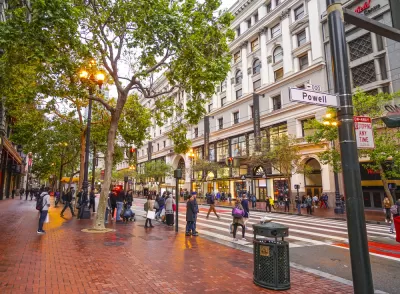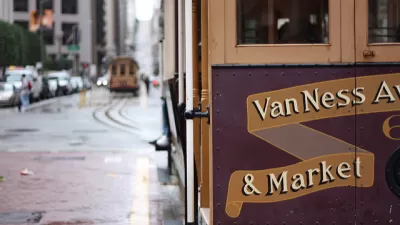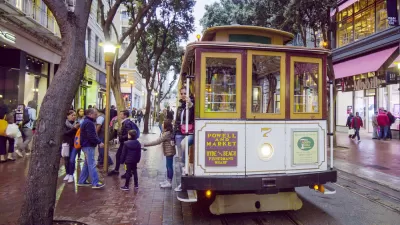The San Francisco Chronicle's urban design critic tempers expectations for Market Street in San Francisco, where the city this week undertook an ambitious, but perhaps over-sold, redesign of the busy street.

"Don’t be surprised if banning cars from the downtown stretch of Market Street doesn’t have the transformative effect that boosters predict," writes John King (in a paywalled article) to throw a little cold water on the excitement surrounding the ambitious street redesign project in the city by the bay.
Instead of a panacea, King recommends readers think of the change as a "welcome move in the right direction."
"It won’t cure the worst of Market Street’s ills. But it will make San Francisco’s most symbolic artery a bit calmer and, with luck, clear the way for other changes," according to King.
As for what people shouldn't expect the change to solve, King lists the continuing messiness of the street, with taxis, delivery vehicles, numerous private automobiles crossing at lights, and buses backing up behind historic streetcars. The changes also won't rid the street of some the unsavory elements current residing on the mid-Market blocks.
King is advocating for some of the project's most enthusiastic boosters to tone down the rhetoric, especially considering the history of over promising and under delivering on the street. A sidebar by King providing a timeline of the history of Market Street leading up to the welcome move in the right direction this week—starting with the film A Trip Down Market Street 1906, continuing through a Critical Mass demonstration that suggested cars should be banned from Market Street in 1993, another round of calls for a car-free Market Street in 2008, and more.
FULL STORY: Will banning cars solve Market Street’s problems? Don’t get your hopes up

Planetizen Federal Action Tracker
A weekly monitor of how Trump’s orders and actions are impacting planners and planning in America.

Maui's Vacation Rental Debate Turns Ugly
Verbal attacks, misinformation campaigns and fistfights plague a high-stakes debate to convert thousands of vacation rentals into long-term housing.

Restaurant Patios Were a Pandemic Win — Why Were They so Hard to Keep?
Social distancing requirements and changes in travel patterns prompted cities to pilot new uses for street and sidewalk space. Then it got complicated.

In California Battle of Housing vs. Environment, Housing Just Won
A new state law significantly limits the power of CEQA, an environmental review law that served as a powerful tool for blocking new development.

Boulder Eliminates Parking Minimums Citywide
Officials estimate the cost of building a single underground parking space at up to $100,000.

Orange County, Florida Adopts Largest US “Sprawl Repair” Code
The ‘Orange Code’ seeks to rectify decades of sprawl-inducing, car-oriented development.
Urban Design for Planners 1: Software Tools
This six-course series explores essential urban design concepts using open source software and equips planners with the tools they need to participate fully in the urban design process.
Planning for Universal Design
Learn the tools for implementing Universal Design in planning regulations.
Heyer Gruel & Associates PA
JM Goldson LLC
Custer County Colorado
City of Camden Redevelopment Agency
City of Astoria
Transportation Research & Education Center (TREC) at Portland State University
Jefferson Parish Government
Camden Redevelopment Agency
City of Claremont




























